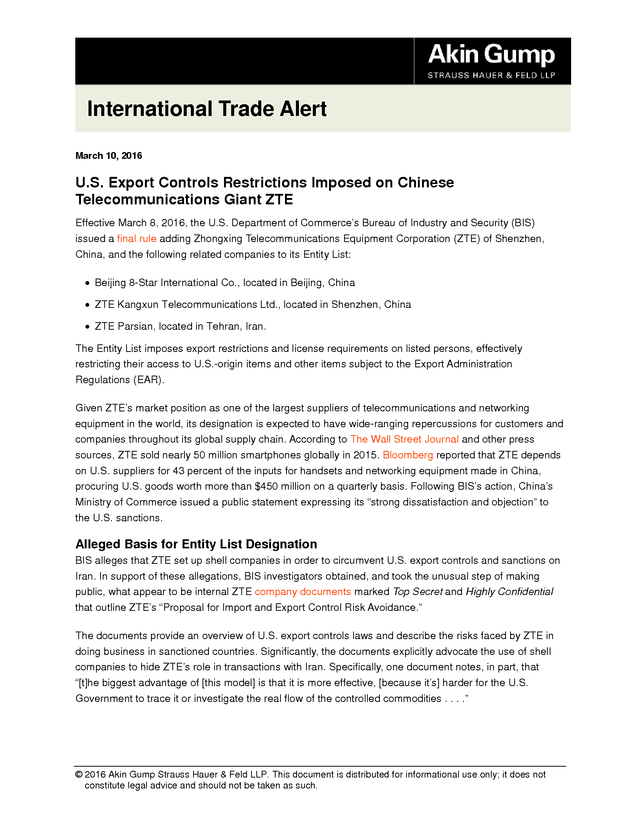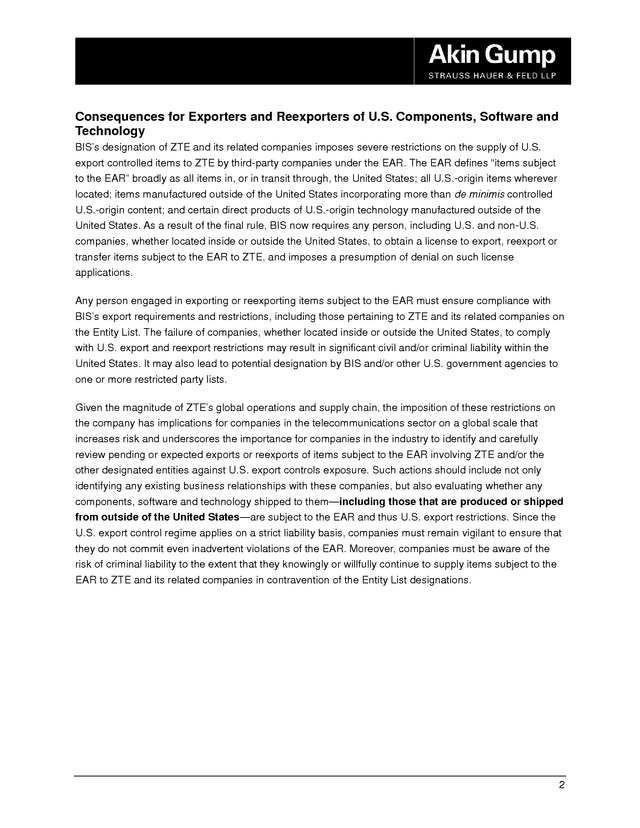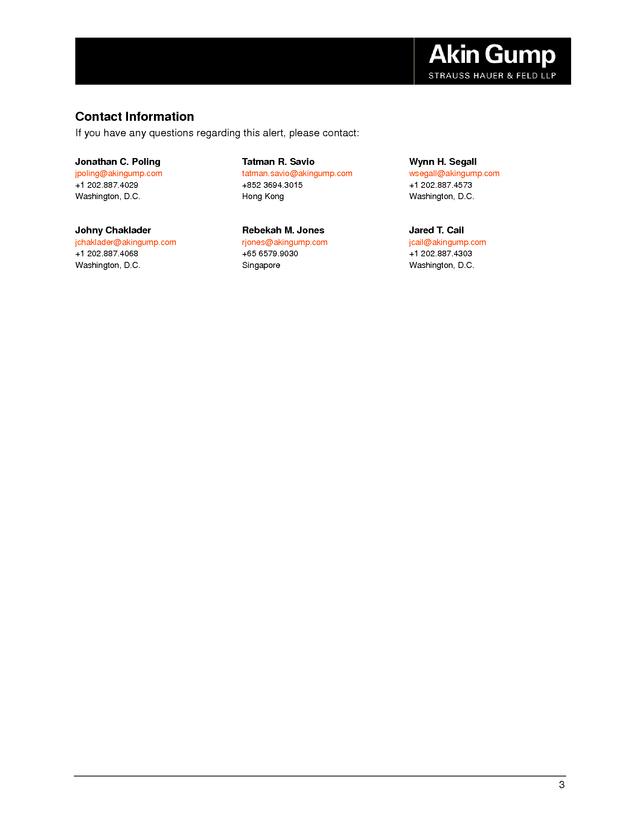U.S. Export Controls Restrictions Imposed on Chinese Telecommunications Giant ZTE – March 10, 2016
Akin Gump Strauss Hauer & Feld
Description
International Trade Alert
March 10, 2016
U.S. Export Controls Restrictions Imposed on Chinese
Telecommunications Giant ZTE
Effective March 8, 2016, the U.S. Department of Commerce’s Bureau of Industry and Security (BIS)
issued a final rule adding Zhongxing Telecommunications Equipment Corporation (ZTE) of Shenzhen,
China, and the following related companies to its Entity List:
• Beijing 8-Star International Co., located in Beijing, China
• ZTE Kangxun Telecommunications Ltd., located in Shenzhen, China
• ZTE Parsian, located in Tehran, Iran.
The Entity List imposes export restrictions and license requirements on listed persons, effectively
restricting their access to U.S.-origin items and other items subject to the Export Administration
Regulations (EAR).
Given ZTE’s market position as one of the largest suppliers of telecommunications and networking
equipment in the world, its designation is expected to have wide-ranging repercussions for customers and
companies throughout its global supply chain. According to The Wall Street Journal and other press
sources, ZTE sold nearly 50 million smartphones globally in 2015.
Bloomberg reported that ZTE depends on U.S. suppliers for 43 percent of the inputs for handsets and networking equipment made in China, procuring U.S. goods worth more than $450 million on a quarterly basis.
Following BIS’s action, China’s Ministry of Commerce issued a public statement expressing its “strong dissatisfaction and objection” to the U.S. sanctions. Alleged Basis for Entity List Designation BIS alleges that ZTE set up shell companies in order to circumvent U.S. export controls and sanctions on Iran.
In support of these allegations, BIS investigators obtained, and took the unusual step of making public, what appear to be internal ZTE company documents marked Top Secret and Highly Confidential that outline ZTE’s “Proposal for Import and Export Control Risk Avoidance.” The documents provide an overview of U.S. export controls laws and describe the risks faced by ZTE in doing business in sanctioned countries. Significantly, the documents explicitly advocate the use of shell companies to hide ZTE’s role in transactions with Iran.
Specifically, one document notes, in part, that “[t]he biggest advantage of [this model] is that it is more effective, [because it’s] harder for the U.S. Government to trace it or investigate the real flow of the controlled commodities . . .
.” © 2016 Akin Gump Strauss Hauer & Feld LLP. This document is distributed for informational use only; it does not constitute legal advice and should not be taken as such. . Consequences for Exporters and Reexporters of U.S. Components, Software and Technology BIS’s designation of ZTE and its related companies imposes severe restrictions on the supply of U.S. export controlled items to ZTE by third-party companies under the EAR. The EAR defines “items subject to the EAR” broadly as all items in, or in transit through, the United States; all U.S.-origin items wherever located; items manufactured outside of the United States incorporating more than de minimis controlled U.S.-origin content; and certain direct products of U.S.-origin technology manufactured outside of the United States. As a result of the final rule, BIS now requires any person, including U.S.
and non-U.S. companies, whether located inside or outside the United States, to obtain a license to export, reexport or transfer items subject to the EAR to ZTE, and imposes a presumption of denial on such license applications. Any person engaged in exporting or reexporting items subject to the EAR must ensure compliance with BIS’s export requirements and restrictions, including those pertaining to ZTE and its related companies on the Entity List. The failure of companies, whether located inside or outside the United States, to comply with U.S. export and reexport restrictions may result in significant civil and/or criminal liability within the United States.
It may also lead to potential designation by BIS and/or other U.S. government agencies to one or more restricted party lists. Given the magnitude of ZTE’s global operations and supply chain, the imposition of these restrictions on the company has implications for companies in the telecommunications sector on a global scale that increases risk and underscores the importance for companies in the industry to identify and carefully review pending or expected exports or reexports of items subject to the EAR involving ZTE and/or the other designated entities against U.S. export controls exposure.
Such actions should include not only identifying any existing business relationships with these companies, but also evaluating whether any components, software and technology shipped to them—including those that are produced or shipped from outside of the United States—are subject to the EAR and thus U.S. export restrictions. Since the U.S.
export control regime applies on a strict liability basis, companies must remain vigilant to ensure that they do not commit even inadvertent violations of the EAR. Moreover, companies must be aware of the risk of criminal liability to the extent that they knowingly or willfully continue to supply items subject to the EAR to ZTE and its related companies in contravention of the Entity List designations. 2 . Contact Information If you have any questions regarding this alert, please contact: Jonathan C. Poling Tatman R. Savio Wynn H. Segall jpoling@akingump.com +1 202.887.4029 Washington, D.C. tatman.savio@akingump.com +852 3694.3015 Hong Kong wsegall@akingump.com +1 202.887.4573 Washington, D.C. Johny Chaklader Rebekah M.
Jones Jared T. Cail jchaklader@akingump.com +1 202.887.4068 Washington, D.C. rjones@akingump.com +65 6579.9030 Singapore jcail@akingump.com +1 202.887.4303 Washington, D.C. 3 .
Bloomberg reported that ZTE depends on U.S. suppliers for 43 percent of the inputs for handsets and networking equipment made in China, procuring U.S. goods worth more than $450 million on a quarterly basis.
Following BIS’s action, China’s Ministry of Commerce issued a public statement expressing its “strong dissatisfaction and objection” to the U.S. sanctions. Alleged Basis for Entity List Designation BIS alleges that ZTE set up shell companies in order to circumvent U.S. export controls and sanctions on Iran.
In support of these allegations, BIS investigators obtained, and took the unusual step of making public, what appear to be internal ZTE company documents marked Top Secret and Highly Confidential that outline ZTE’s “Proposal for Import and Export Control Risk Avoidance.” The documents provide an overview of U.S. export controls laws and describe the risks faced by ZTE in doing business in sanctioned countries. Significantly, the documents explicitly advocate the use of shell companies to hide ZTE’s role in transactions with Iran.
Specifically, one document notes, in part, that “[t]he biggest advantage of [this model] is that it is more effective, [because it’s] harder for the U.S. Government to trace it or investigate the real flow of the controlled commodities . . .
.” © 2016 Akin Gump Strauss Hauer & Feld LLP. This document is distributed for informational use only; it does not constitute legal advice and should not be taken as such. . Consequences for Exporters and Reexporters of U.S. Components, Software and Technology BIS’s designation of ZTE and its related companies imposes severe restrictions on the supply of U.S. export controlled items to ZTE by third-party companies under the EAR. The EAR defines “items subject to the EAR” broadly as all items in, or in transit through, the United States; all U.S.-origin items wherever located; items manufactured outside of the United States incorporating more than de minimis controlled U.S.-origin content; and certain direct products of U.S.-origin technology manufactured outside of the United States. As a result of the final rule, BIS now requires any person, including U.S.
and non-U.S. companies, whether located inside or outside the United States, to obtain a license to export, reexport or transfer items subject to the EAR to ZTE, and imposes a presumption of denial on such license applications. Any person engaged in exporting or reexporting items subject to the EAR must ensure compliance with BIS’s export requirements and restrictions, including those pertaining to ZTE and its related companies on the Entity List. The failure of companies, whether located inside or outside the United States, to comply with U.S. export and reexport restrictions may result in significant civil and/or criminal liability within the United States.
It may also lead to potential designation by BIS and/or other U.S. government agencies to one or more restricted party lists. Given the magnitude of ZTE’s global operations and supply chain, the imposition of these restrictions on the company has implications for companies in the telecommunications sector on a global scale that increases risk and underscores the importance for companies in the industry to identify and carefully review pending or expected exports or reexports of items subject to the EAR involving ZTE and/or the other designated entities against U.S. export controls exposure.
Such actions should include not only identifying any existing business relationships with these companies, but also evaluating whether any components, software and technology shipped to them—including those that are produced or shipped from outside of the United States—are subject to the EAR and thus U.S. export restrictions. Since the U.S.
export control regime applies on a strict liability basis, companies must remain vigilant to ensure that they do not commit even inadvertent violations of the EAR. Moreover, companies must be aware of the risk of criminal liability to the extent that they knowingly or willfully continue to supply items subject to the EAR to ZTE and its related companies in contravention of the Entity List designations. 2 . Contact Information If you have any questions regarding this alert, please contact: Jonathan C. Poling Tatman R. Savio Wynn H. Segall jpoling@akingump.com +1 202.887.4029 Washington, D.C. tatman.savio@akingump.com +852 3694.3015 Hong Kong wsegall@akingump.com +1 202.887.4573 Washington, D.C. Johny Chaklader Rebekah M.
Jones Jared T. Cail jchaklader@akingump.com +1 202.887.4068 Washington, D.C. rjones@akingump.com +65 6579.9030 Singapore jcail@akingump.com +1 202.887.4303 Washington, D.C. 3 .















